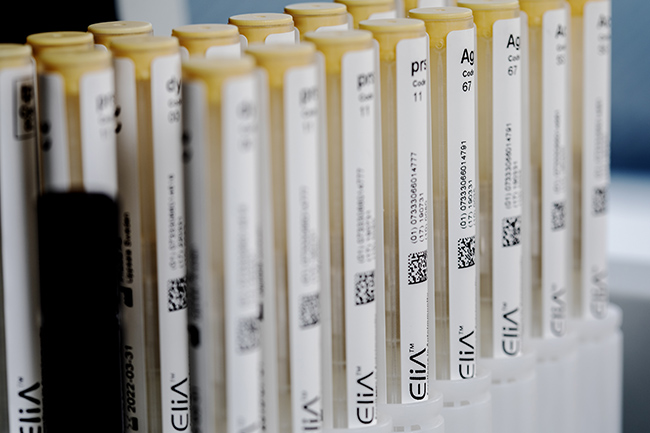Published: June 2025
Medically reviewed by:
Eva Södergren, Sr Manager, Global Medical & Scientific Affairs, Allergy
Different types of blood tests (screening, individual Specific IgE tests and multiplex tests) help diagnosis IgE-mediated allergies. This article focuses on why it is important to use the right test, at the right time, for the right patient in IgE-mediated allergies.
Guidelines on the diagnosis of IgE-mediated food allergy.
Which indication for which test?
EAACI (European Academy of Allergy and Clinical Immunology) has recently published guidelines on the diagnosis of IgE-mediated food allergy. The following is an extract from these recommendations:
Following an allergy-focused history, evidence of allergen-specific IgE should be sought to support the diagnosis of IgE-mediated food allergy. Such evidence may be provided by one or more of the following tests:1
Clinical history + specific IgE / skin prick test
Molecular IgE test
Basophil activation test
Oral food challenge
ImmunoCAP tests can be a diagnostic aid at all steps of the allergic patient's pathway.

* To be interpreted according to the patient's symptoms, clinical history and other results (skin tests, challenge tests, etc.) ** Clinical questions
The place of multiplex tests (When to use multiplex tests?)
Multiple molecular allergen tests can be useful in specific cases1-2:
- Complex polysensitization
- Idiopathic anaphylaxis requires investigating latentizing co-factors and/or hidden allergens
It is important to emphasize that multiplex tests should never be used for screening or as a first-level test.1
Testing should be selected based on the medical history and should not include large screening panels.1-5 This recommendation is per the guidelines of many countries.1-5
Why is it essential to follow this indication for patient management?
More is not always better
Usage not aligned with the provided guidance can have a negative impact on patients as well as the health care system.2
Using multiplex can potentially be dangerous when used outside its indications or as a screening test.2 Interpretation without relating clinical symptoms may lead to:3
- Unnecessary and potentially harmful dietary restrictions
- Nutritional implications for children
- Unnecessary fear and anxiety for the family or carers
In pediatric allergology, especially in the diagnosis of food allergy, such as in the eczematous symptoms of children, the multiplex test can provide information on sensitization levels of unknown clinical relevance.2
A sensitization is different than an allergy!
Multiplex tests are semi-quantitive
A limitation of multiplex methodologies is that they are semi-quantitative and cannot therefore be used for patient follow-up as recommended by EAACI.1,2
Repeated testing of specific IgE at age-varying intervals is an aid to:
- Assess if tolerance is developed (decrease in specific IgE)1,6
- Decide to perform an oral food challenge (OFC)1
- Determine the right time to reintroduce the avoided food to the diet1,6,7
For the patient follow-up, it is important to measure specific IgE using the same quantitative technique1,8
Multiplex tests have inferior sensitivity
Another limitation of “multiplex” methodologies is that they are semi-quantitative and less sensitive than “singleplex”.2
The lower sensitivity of the “multiplex” methodologies is highlighted even more heavily on the “performance” of IgE measurement for extracts where the choice of the allergenic substrate is particularly critical.2
Have you ever thought about the consequences of a negative test for the allergen the patient is allergic to?
ImmunoCAP™ sIgE tests: Clinically and scientifically validated testing technology you can trust
For fully quantitative results, an assay needs to show resistance against competing allergen-specific non-IgE antibodies.9 In multiplex systems, IgG competition can reduce, and also completely block, IgE binding.10
ImmunoCAP technology has a unique high binding capacity solid phase that facilitates access presence of allergen epitopes. This makes it possible to detect extremely low serum concentrations of specific IgE, avoiding interference from other classes of immunoglobulins present.11

ImmunoCAP ISAC is the preferred multiplex technology
For pediatric patients, priority should be given to the reduced volume of serum, the wide reading range of the results, the calculation of results from “multiplets”, and correlation with ImmunoCAP technology, which is considered the gold standard of tests in in-vitro allergy diagnostics.2
A recent Italian multicenter study compared ALEX to ISAC. The qualitative comparison analysis (negative/ positive results) shows a concordance of 71% if negative concordant results are excluded. The analysis of the panallergens provided in both methods suggests a better performance of the ISAC® test on those components.2,12
ImmunoCAP complete portfolio
- More than 500 whole allergens and allergen mixes.
- More than 100 allergen components help differentiate between primary sensitisation and cross-reactivity.
- ImmunoCAP™ Phadiatop™/Phadiatop™ Infant tests help to rule in or rule out atopic allergy.13-17
- A specific IgE multiplex test with 112 allergen components.18
- Helps healthcare providers resolve puzzling allergies.19
- The easy and convenient point-of-care test for a first-line evaluation of allergy.20-23
- Wheeze, rhinitis and asthma-related allergens.
- Two different panels - for adults and for children available (each with 10 allergens).24-25
- Results within 20 minutes.
- Quantifies total concentration of IgE.26
- In patients suffering from asthma, rhinitis, or atopic dermatitis due to allergy, the concentration of total IgE may be elevated.27
- Marker of exposure to antigens.28
- Used as an aid in the diagnosis of various allergic diseases, gastrointestinal disorders, and lung diseases such as allergic alveolitis, based on relevant peer-reviewed published evidence.28
- Aids in assessing the development of allergic tolerance (e.g., monitoring immunotherapy).29
- Measures the level of Eosinophil Cationic Protein (ECP) in serum.30
- Aid in the asthma diagnosis.30
- The level of ECP has been shown to correlate with asthma severity.30
- Elevated tryptase may be a risk factor in patients with a history of severe allergic reactions.31
- It is intended for IVD use as an aid in the clinical diagnosis of systemic mastocytosis and mast cell activation events.31
With ImmunoCAP tests, you can use the right test, at the right time, for the right patient in the IgE-mediated allergies.



